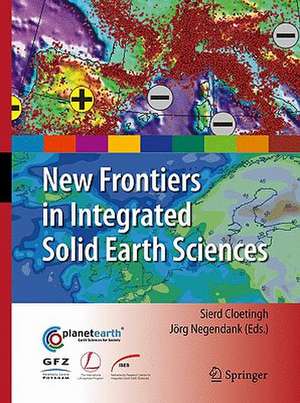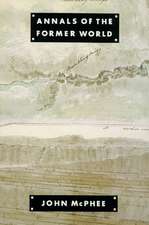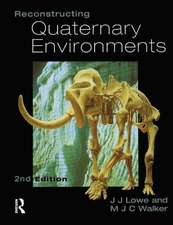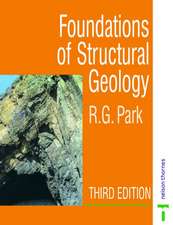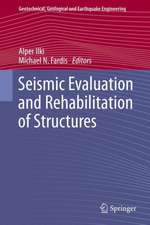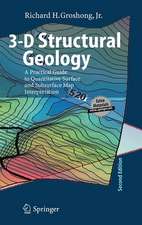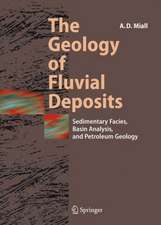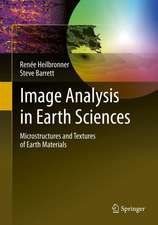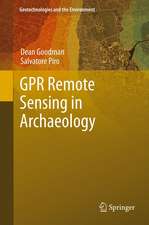New Frontiers in Integrated Solid Earth Sciences: International Year of Planet Earth
Editat de S.A.P.L. Cloetingh, Jorg Negendanken Limba Engleză Hardback – 22 ian 2010
As advances in the earth sciences lead to process-oriented ways of modeling the complex processes in the solid Earth, the papers in this volume provide a survey of some recent developments at the leading edge of this highly technical discipline. The chapters cover current research in predicting the future behavior of geologic systems as well as the mapping of geologic patterns that exist now in the subsurface as frozen evidence of the past. Both techniques are highly relevant to humanity’s need for resources such as water, and will also help us control environmental degradation.
The book also discusses advances made in seismological methods to obtain information on the 3D structure of the mantle and the lithosphere, and in the quantitative understanding of lithospheric scale processes. It covers recent breakthroughs in 3D seismic imaging that have enhanced the spatial resolution of these structural processes, and the move towards 4D imaging that measures these processes over time.
The new frontier in modern Earth sciences described in this book has major implications for oceanographic and atmospheric sciences and our understanding of climate variability. It brings readers right up to date with the research in this vital field.
| Toate formatele și edițiile | Preț | Express |
|---|---|---|
| Paperback (1) | 584.56 lei 39-44 zile | |
| SPRINGER NETHERLANDS – 23 aug 2016 | 584.56 lei 39-44 zile | |
| Hardback (1) | 665.42 lei 6-8 săpt. | |
| SPRINGER NETHERLANDS – 22 ian 2010 | 665.42 lei 6-8 săpt. |
Preț: 665.42 lei
Preț vechi: 782.84 lei
-15% Nou
Puncte Express: 998
Preț estimativ în valută:
127.32€ • 133.65$ • 105.68£
127.32€ • 133.65$ • 105.68£
Carte tipărită la comandă
Livrare economică 10-24 aprilie
Preluare comenzi: 021 569.72.76
Specificații
ISBN-13: 9789048127368
ISBN-10: 904812736X
Pagini: 436
Ilustrații: XIX, 414 p.
Dimensiuni: 193 x 260 x 32 mm
Greutate: 1.11 kg
Ediția:2010
Editura: SPRINGER NETHERLANDS
Colecția Springer
Seria International Year of Planet Earth
Locul publicării:Dordrecht, Netherlands
ISBN-10: 904812736X
Pagini: 436
Ilustrații: XIX, 414 p.
Dimensiuni: 193 x 260 x 32 mm
Greutate: 1.11 kg
Ediția:2010
Editura: SPRINGER NETHERLANDS
Colecția Springer
Seria International Year of Planet Earth
Locul publicării:Dordrecht, Netherlands
Public țintă
ResearchCuprins
Perpectives on Integrated Solid Earth Sciences.- 3D Crustal Model of Western and Central Europe as a Basis for Modelling Mantle Structure.- Thermal and Rheological Model of the European Lithosphere.- Thermo-Mechanical Models for Coupled Lithosphere-Surface Processes: Applications to Continental Convergence and Mountain Building Processes.- Achievements and Challenges in Sedimentary Basin Dynamics: A Review.- Recent Developments in Earthquake Hazards Studies.- Passive Seismic Monitoring of Natural and Induced Earthquakes: Case Studies, Future Directions and Socio-Economic Relevance.- Non-volcanic Tremor: A Window into the Roots of Fault Zones.- Volcanism in Reverse and Strike-Slip Fault Settings.- DynaQlim – Upper Mantle Dynamics and Quaternary Climate in Cratonic Areas.- Ultradeep Rocks and Diamonds in the Light of Advanced Scientific Technologies.- New Views of the Earth’s Inner Core from Computational Mineral Physics.
Textul de pe ultima copertă
Man’s intensifying use of the Earth’s habitat has led to an urgent need for scientifically advanced 'geo-prediction systems' that accurately locate subsurface resources and forecast the timing and magnitude of earthquakes, volcanic eruptions and land subsidence.
As advances in the earth sciences lead to process-oriented ways of modeling the complex processes in the solid Earth, the papers in this volume provide a survey of some recent developments at the leading edge of this highly technical discipline.
The chapters cover current research in predicting the future behavior of geologic systems as well as the mapping of geologic patterns that exist now in the subsurface as frozen evidence of the past. Both techniques are highly relevant to humanity’s need for resources such as water, and will also help us control environmental degradation.
The book also discusses advances made in seismological methods to obtain information on the 3D structure of the mantle and the lithosphere, and in the quantitative understanding of lithospheric scale processes. It covers recent breakthroughs in 3D seismic imaging that have enhanced the spatial resolution of these structural processes, and the move towards 4D imaging that measures these processes over time.
The new frontiers in modern Earth sciences described in this book have major implications for oceanographic and atmospheric sciences and our understanding of climate variability. It brings readers right up to date with the research in this vital field.
As advances in the earth sciences lead to process-oriented ways of modeling the complex processes in the solid Earth, the papers in this volume provide a survey of some recent developments at the leading edge of this highly technical discipline.
The chapters cover current research in predicting the future behavior of geologic systems as well as the mapping of geologic patterns that exist now in the subsurface as frozen evidence of the past. Both techniques are highly relevant to humanity’s need for resources such as water, and will also help us control environmental degradation.
The book also discusses advances made in seismological methods to obtain information on the 3D structure of the mantle and the lithosphere, and in the quantitative understanding of lithospheric scale processes. It covers recent breakthroughs in 3D seismic imaging that have enhanced the spatial resolution of these structural processes, and the move towards 4D imaging that measures these processes over time.
The new frontiers in modern Earth sciences described in this book have major implications for oceanographic and atmospheric sciences and our understanding of climate variability. It brings readers right up to date with the research in this vital field.
Caracteristici
The book focuses on two key questions: How we can better understand mass transfer at Earth’s surface, and its feedback with deep Earth recycling How our improved understanding of Earth processes can lead to better prediction
